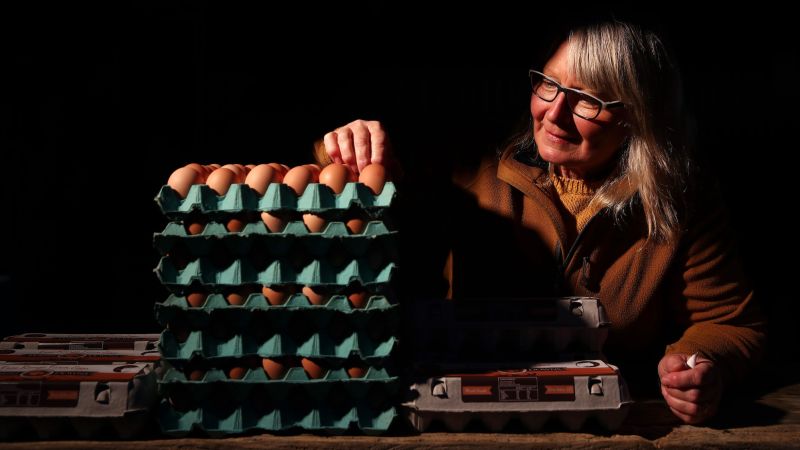Hong Kong
CNN
—
Eggs have soared in cost around the world over the past year as avian flu decimated chicken flocks and fallout from Russia’s war with Ukraine raised the prices of energy and animal feed.
In the United States, egg prices have far surpassed the increase in other grocery items, soaring nearly 60% in the 12 months to December compared to the year before. In Japan, wholesale prices have reached a record high.
In New Zealand, which consumes more eggs per person than most countries, the squeeze has been exacerbated by a change in farming regulations. And rising costs have sparked a frenzy, with people hunting for hens online so they can secure their own supplies of the pantry staple.
On Tuesday, popular local auction site Trade Me told CNN that searches for chickens, and equipment related to caring for them, had spiked 190% so far this month, compared to the same period a month ago.
“Since the start of January, we have seen over 65,000 searches for chickens and other chicken-related items, like feeders, coops and food,” said Millie Silvester, a spokesperson for the company.
The shortage has also caused a particularly acute headache for bakers in the country.
“All the public are now trying to buy chickens for home because they can’t get eggs,” said Ron van Til, a bakery owner near the city of Christchurch, who has had to adjust how he makes his cakes and muffins.
Van Til said his sister was selling “four brand new chickens” on auction through Trade Me, fetching more than double the usual price.
The trend has prompted animal welfare advocates to warn against making impulse buys.
“Chickens live for a long time,” said Gabby Clezy, CEO of the Society for the Prevention of Cruelty to Animals (SPCA) in New Zealand. “They live from eight to 10 years, sometimes even longer depending on the breed.”
Clezy also noted that hens do not produce eggs their entire lives, and their laying habits are dependent on factors including their age and local climate.
“So if people are getting chickens solely because [they think] they’ll have a permanent supply of eggs, that just isn’t the case,” she said. “We’re asking people to consider them as companion animals, which they are.”
Trade Me has also urged customers on its marketplace to think through any purchases.
“It’s important that our members are aware of the responsibilities that come with owning chickens, and are well set up to care for them,” Silvester said in a statement.
Health experts are weighing in, too. According to the US Centers for Disease Control and Prevention (CDC), anyone signing up for a backyard coop should take special care when handling the animals and their eggs, particularly because of the risk of germs associated with salmonella.
New Zealand’s egg shortage has been linked to a long anticipated change in farming law, which took effect on January 1 this year.
The law prohibits the production of eggs from chickens kept in conventional or “battery cages” — typically cramped metal spaces that do not provide adequate welfare for hens, according to SPCA.
That’s why in 2012, the government announced a ban on such facilities.
But “a 10-year transition period away from conventional cages was introduced, to allow egg producers time to shift farming practices,” Peter Hyde, a representative for New Zealand’s Ministry for Primary Industries, told CNN in a statement when asked about the current shortage.
“Egg producers had the option to move to colony cages, barns and free-range systems,” added Hyde, the ministry’s acting national manager of animal welfare and national animal identification and tracing compliance.
Hyde said that over the last 18 months, the ministry had “been in regular contact with operators, and visited farms needing to transition.”
Even with the long lead time, however, the ban has caused supply snags, according to some businesses.
Foodstuffs, a New Zealand supermarket chain, recently placed temporary limits on how many eggs each customer can buy.
“It’s a significant change for the egg supply industry,” Emma Wooster, the company’s head of public relations, told CNN in a statement. “We’re working with egg suppliers to increase our offer in other types of eggs.”
Countdown, another major grocery retailer, said while it did not currently have limits on egg sales, it would encourage customers to “only buy what they need” to ensure enough supply for everyone.
Other businesses have been forced to switch things up.
Van Til, the bakery owner, said his team had swapped out fresh eggs in recipes for alternative ingredients.
The longtime owner of Rangiora Bakery has seen wholesale prices for fresh eggs shoot up about 50% compared to four months ago, leading him to buy more dried eggs instead.
Van Til also pointed to changes at other local eateries, saying some cafes had started taking certain dishes off their menus so “instead of having five breakfast items [with] eggs, you might only have two.”
“And the customer hopefully will pick up pancakes or waffles,” he added. “Or whatever other offerings you come up with.”

